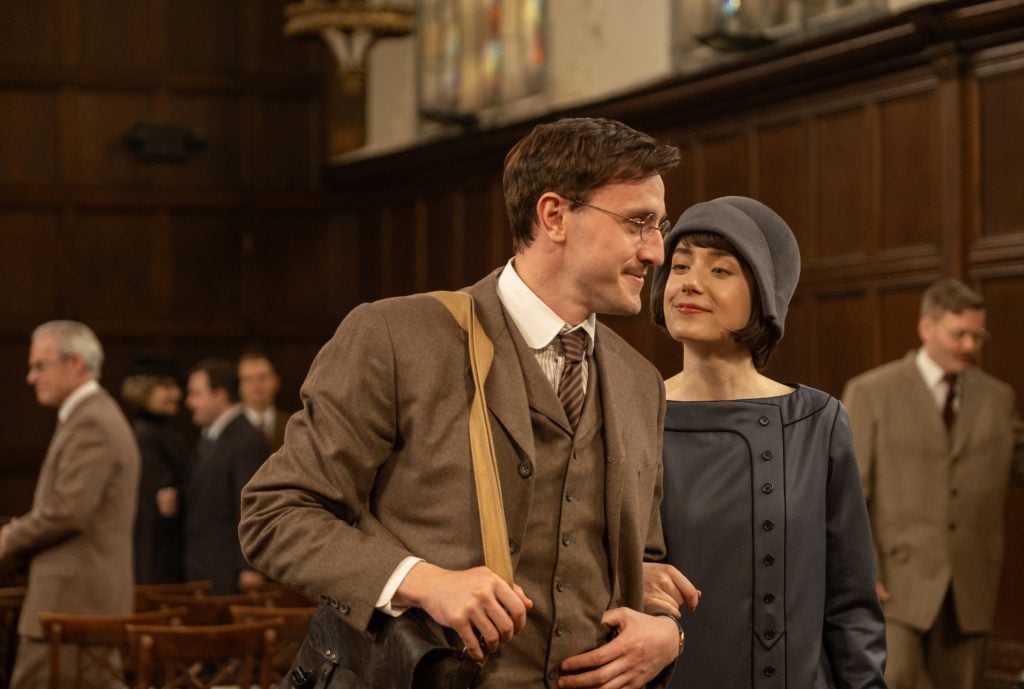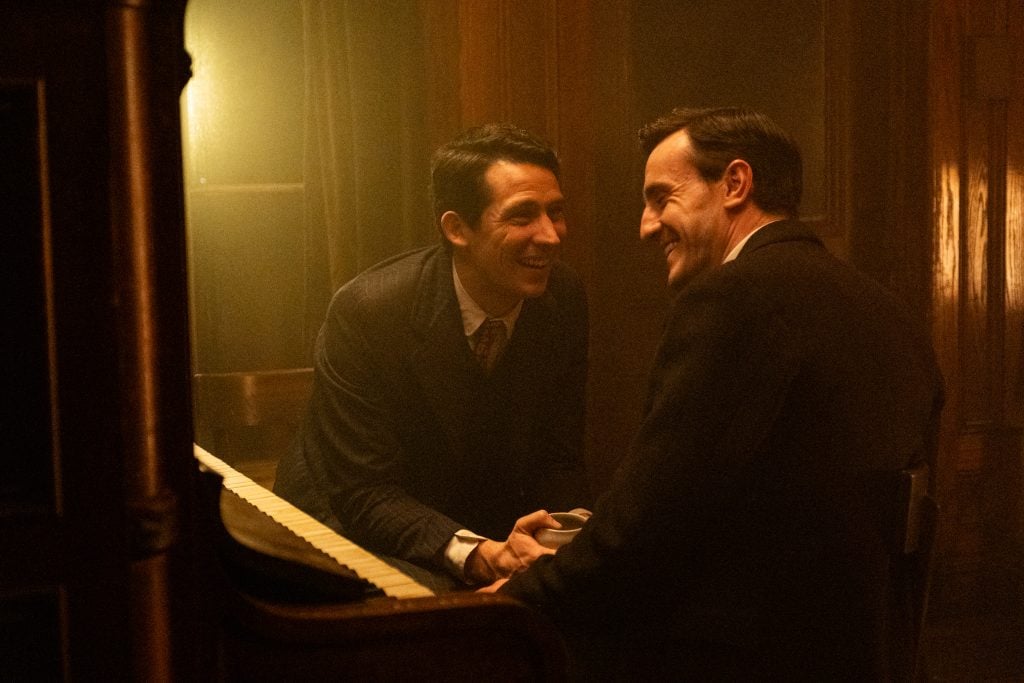“I can see music.”
Those are among the words that open The History of Sound, Oliver Hermanus’s film about two young men traveling across Maine in the aftermath of World War I to ostensibly record the music of a nation in recovery. Look beyond that mission, and you find two men who use music as a conduit to convey feelings that, in any other language, would have them ostracized, abused, or even killed by an intolerant populace. Because the risk is so great, the characters interpreting music to the point of transcending its original sense is such a powerful idea that it invites scrutiny. What is it about these young men that forges such a strong connection between them? Is there something particularly unique about them, or is this just romantic pablum that we as a culture should’ve outgrown by now?
The History of Sound isn’t especially worried about cynical questions of its premise, or the inevitable comparisons one might make to similar queer films like My Own Private Idaho or Brokeback Mountain. His focus is solely on Lionel Worthing (Paul Mescal), a singer from a rustic village who studies at the Boston Music Conservatory in 1917. There, he meets David White (Josh O’Connor), and the two quickly become lovers. David is sent off to fight in Europe, separating the couple for years. After this time apart, the men reunite for David’s research assignment, recording folk songs like the ones they used to sing at school together. In their travels and in the years after, we see how time, distance, and the effects of war shape who they are and what they become.

Although the film spans several years and multiple locations, The History of Sound’s scope is relatively narrow. The film is less of a love story than it is about how it fits into the grander scheme of one’s life, specifically Lionel’s. We spend much more time with Lionel than with David outside of their trip: at home on the farm with his disabled mother, singing with an Italian men’s choir, teaching music at Oxford, and returning to the States to find David again. At times, it can feel like Hermanus is meandering through the stages of Lionel’s life, centering on moments that feel beside the point, if the point is Lionel and David’s romance. Yes, Lionel floating in a fountain looks gorgeous, as does the entire film, thanks to Alexander Dynan’s stunning visuals. But what does that mean other than “Lionel misses David,” which isn’t an especially unique insight.
The point that rings out beneath those stunning visuals is how music and love are intricately linked, at least for Lionel. By the looks of his later years, Lionel has succeeded far beyond what his childhood home on the farm would suggest. He sings, he teaches, he travels the world, and finds male and female lovers. However, nothing satisfies him. He is unmoored, floating through life rather than living it. He may have music in his life, but he doesn’t have David, and Hermanus makes you feel the difference. He conceives David and Lionel’s recording scenes with a gentle brightness that reflects the tenor of their romance. David’s presence is responsible for this perfect blend of man and music.

Those scenes contrast with Lionel in Italy, where the sun is a touch too bright, or him at his girlfriend’s countryside estate, which is cloaked in suffocating darkness except for a single stream of light aimed at the piano. Lionel lies on the ground inside that stream of moonlight and immediately recalls a conversation he and David once had about their future. For Lionel and Hermanus, music without a person to share it with is incomplete, especially if you’ve already experienced it with someone in the past.
It’s an affecting insight that Hermanus conveys beautifully in his direction. However, like Lionel and music without David, it also feels incomplete. Lovely as their romance is, Hermanus introduces shades of conflict that are fascinating but left hanging. David’s struggles with postwar depression are largely unexplored, reserved for some distant, faraway stares, and David’s description of the trenches as dim and cold. Also glossed over are David and Lionel’s cultural differences, such as their views on race, which are hinted at when they record a Black family’s song. David expresses guilt at leaving them when it’s implied they’re about to be attacked by racists, while Lionel regards it as a fact of life. The gap in their perceptions of society, culture, and even their places within them is significant, and seeing how that gap plays out within their relationship would add greater weight to their seemingly insurmountable bond.

Paul Mescal and Josh O’Connor are another pair of actors who, surprisingly, haven’t starred together before. It’s easy to imagine them complementing each other well, as they both operate within quieter, intimate frequencies of the performance spectrum. They deliver on that perceived promise, crafting a sparkling chemistry between them with brief whispers of heat. (The film is notably light on love scenes, per Hermanus’s intent.) O’Connor is very charismatic as David, drawing us in but keeping us at arm’s length so we can’t see the extent of his vulnerabilities and the war’s scars. As Lionel, Mescal further bolsters his credentials as the quintessential strong, tortured type of his generation. His best work is playing against either O’Connor or Hadley Robinson as David’s wife, Belle, both of whom crack through his stoicism and make him bleed either raw passion or raw agony.
For a film titled The History of Sound, it is a tranquil work. Hermanus doesn’t inundate us with fevered desire or heartbeat-tinged rage. He takes a more contemplative approach to Lionel and David’s love, showing its profound effect in the larger context of the protagonist’s life. It isn’t the most engrossing or even inviting take on romance, but there is a loveliness to find within the stillness. Hermanus, with Mescal and O’Connor’s help, will make you believe that the lovers can actually see music. However, the volume is a few decibels too soft for it to truly sing.
The History of Sound is currently playing in theaters courtesy of Mubi.
It isn’t the most engrossing or even inviting take on romance, but there is a loveliness to find within the stillness. Hermanus, with Mescal and O’Connor’s help, will make you believe that the lovers can actually see music. However, the volume is a few decibels too soft for it to truly sing.
-
GVN Rating 7
-
User Ratings (0 Votes)
0
A late-stage millennial lover of most things related to pop culture. Becomes irrationally irritated by Oscar predictions that don’t come true.






